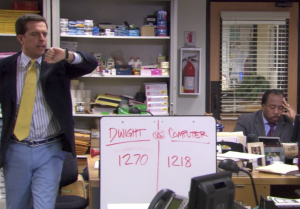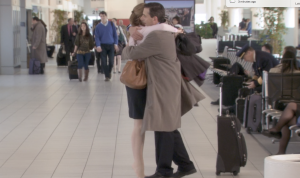Do you like your job? Do you think that it has meaning or significance? Do you relate with your company’s mission? If you responded “no” to any of those questions, you are far from alone. Forbes reports that 52.3% of Americans are unhappy at work (Adams), and a study by the Harvard Business Review of 12,000 professionals found that half answered “no” to each of the latter two questions (Bergman). So, what’s going wrong? We tell our kids they are going to be successful and change the world, but by the time they enter the workforce, they don’t care about their jobs and aren’t dedicated to bettering themselves or society. How, then, can they be convinced that their work does matter? One solution is to sit down and watch The Office.
David Graeber argues that much of people’s unhappiness at work can be attributed to “bullshit jobs”, which he says exist “as if someone were out there making up pointless jobs just for the sake of keeping us all working”. What, specifically, are these jobs, you ask? They are “professional, managerial, clerical, sales, and service” positions, and I would wage that if you answered “no” to the questions earlier, your work is included in this list.
Enter The Office: a fictional documentary of people doing the bullshittiest of bullshit jobs. Within four minutes of the first episode, Jim tries to describe his work, but says that he’s “boring himself just talking about this”. Right off the bat, it is clear that this show is meant to epitomize the crisis of employees feeling unhappy and useless in the American workplace. They have an annoying boss, work in a branch that is likely to be shut down soon due to downsizing, and are doing work that can be done just as easily by machines.
This fear that robots are going to take away our jobs is one that has been around for decades. But more recently, the technology has become so advanced that this is no longer just a fear but an imminent reality. It is estimated that at least 47% of all American jobs are at high risk of being overtaken by machines in the next 20 years (Bregman). And you guessed it, the jobs that are most likely to be taken over by computers are none other than the “bullshit jobs”. But the fear that machines will take over our jobs doesn’t just make us afraid of the future, it also reinforces the idea that the work we are doing right now is pointless.
The Office recognizes the enormous weight of this and in a comical way, challenges its validity. The most blatant example of this is during the episode “Launch Party”, in which Dwight takes on the company’s new website, Dunder Mifflin Infinity. The site makes and records its paper sales, just as a salesperson would. Dwight, refusing to bow to machines, takes on and succeeds at the challenge of selling more reams of paper during the work day than it. Sure, the episode was hilarious, but whether the viewer realized it or not, it also left them with the idea that ultimately, machines can’t do what people can.

In fact, the whole show highlights the importance of people, and more specifically, their relationships with one another. The overarching plot through the many seasons is about how the characters on the show are growing and becoming happier. At the beginning, Michael Scott is pretty unlovable. He makes crude and insensitive jokes and seems to care little about his workers. In response, the employees dislike their boss and try to avoid him as much as possible. But throughout the show, we see that he really does care for his employees. In “Goodbye, Michael”, which is about Michael’s last day before he moves to Colorado and leaves the show, he says, “the people you work with are, just when you get down to it, your very best friends”. Because of this, both we, the viewers, and his employees, have a change of heart for Michael. This is well represented by his relationship with Pam. At the start of the show, she found him annoying on a good day and downright offensive on a bad one. But In “Goodbye, Michael”, she chases him down at the airport to tearfully say goodbye to him before he leaves. It is clear that her attitude towards him has shifted and she cares deeply for him.

But Pam changes more than just in her relationship with Michael; she changes her entire person. Initially, she is insecure and easily pushed around, especially by her fiancée at the time. She seems to have no purpose in life and has no hope of future success. But throughout the show, she takes control of her life: she dumps her fiancée, marries Jim, pursues her love of art, and after trying her hand at being a saleswoman, convinces her bosses to give her the position of administrative assistant. Though it is not a high-level title, being administrative assistant gives her power and allows her to make herself more essential to the company. By the end of the series, Pam is visibly more confident, more productive, and more content in her role at the office. Note also that she is able to find a position she likes within the company rather than going elsewhere like many people would think to do if they were unhappy.
This relationship between the company and its employees is very important. Even though at times it seems like Dunder Mifflin doesn’t care about its workers, the employees ultimately have a positive attitude towards “corporate”. David Wallace, the chief financial officer, is the most consistent character to represent corporate and seems to be liked by most of the Scranton branch. He’s easy to talk to, as can be seen when he’s chatting and shooting hoops with Jim, and comes across as a wholesome family man. Despite losing his job during season six, Wallace returns in season eight to buy back the company and save it from the crazy CEO. He has an individual relationship with each of his employees and through him, it is implied that the entire company cares about the workers. Yes, it has temporary failures, but in the end, Dunder Mifflin comes across as a corporation that values its employees and treats them well.
One time in particular that Wallace fails an employee is during “The Deposition” when he says that he was never seriously considering Michael for the corporate job, which is incredibly upsetting to Michael, who believed he was being “groomed” for it. Even so, when Michael is asked if he agrees that the company “exhibits a pattern of disrespect towards its employees”, his response is “absolutely not”. And this response is not an easy one. If he had said yes, his girlfriend, Jan, would have won 4 million dollars in a lawsuit against Dunder Mifflin, but because he ultimately trusts the company and believes that it has his best interests at heart, he sides with it. But where Michael normally seems foolish and silly, his loyalty to the company is framed in a way that makes him seem noble and causes the viewer to respect him more.
But what does Michael standing up to his girlfriend have to do with believing your work matters? The Office is telling you that even if your company seems to be screwing you over and your boss seems like an asshole, they ultimately do care about you and you should care for them in return. When Michael sides with Dunder Mifflin in the lawsuit, it is sending the message that believing in your company is a good thing. These people are in as bad of a position as it gets when it comes to useless jobs, but ultimately, they still find their work to be a positive place. They can see that Dunder Mifflin does indeed want the best for them, and they are seen as better for caring about the company in return. They find that there is a mutual love between them and their boss, and as they discover this good relationship they also become happier. Pam’s improvement as a person coincides directly with her finding meaning in her work through good relationships in the office and a position that she likes. And forget about machines replacing your jobs. The show is saying that you are more capable than a computer and are valued as so. In the end, Dunder Mifflin Infinity gets shut down while Dwight persists through entire series, so it is clear that even if your job feels mundane, you are necessary not just to the company but to the functionality of society.
Through its story, The Office is trying to get its viewers to believe that they have a valued spot in the workplace. It is attempting to soothe American’s fears that their work is mundane and they are replaceable. It is telling you that even if it seems like you have a “bullshit job”, you should care about your work because your boss and your company and the people around you care about you. So, what may seem on the surface like mindless humor is actually teaching you to be content with your deadening job. Don’t even try to do something else, it’s telling you: you will fail like Michael and his startup or Pam and art school. You will end up right back at the company where you started. You belong at your company and you will be happiest there, or so they want you to believe.